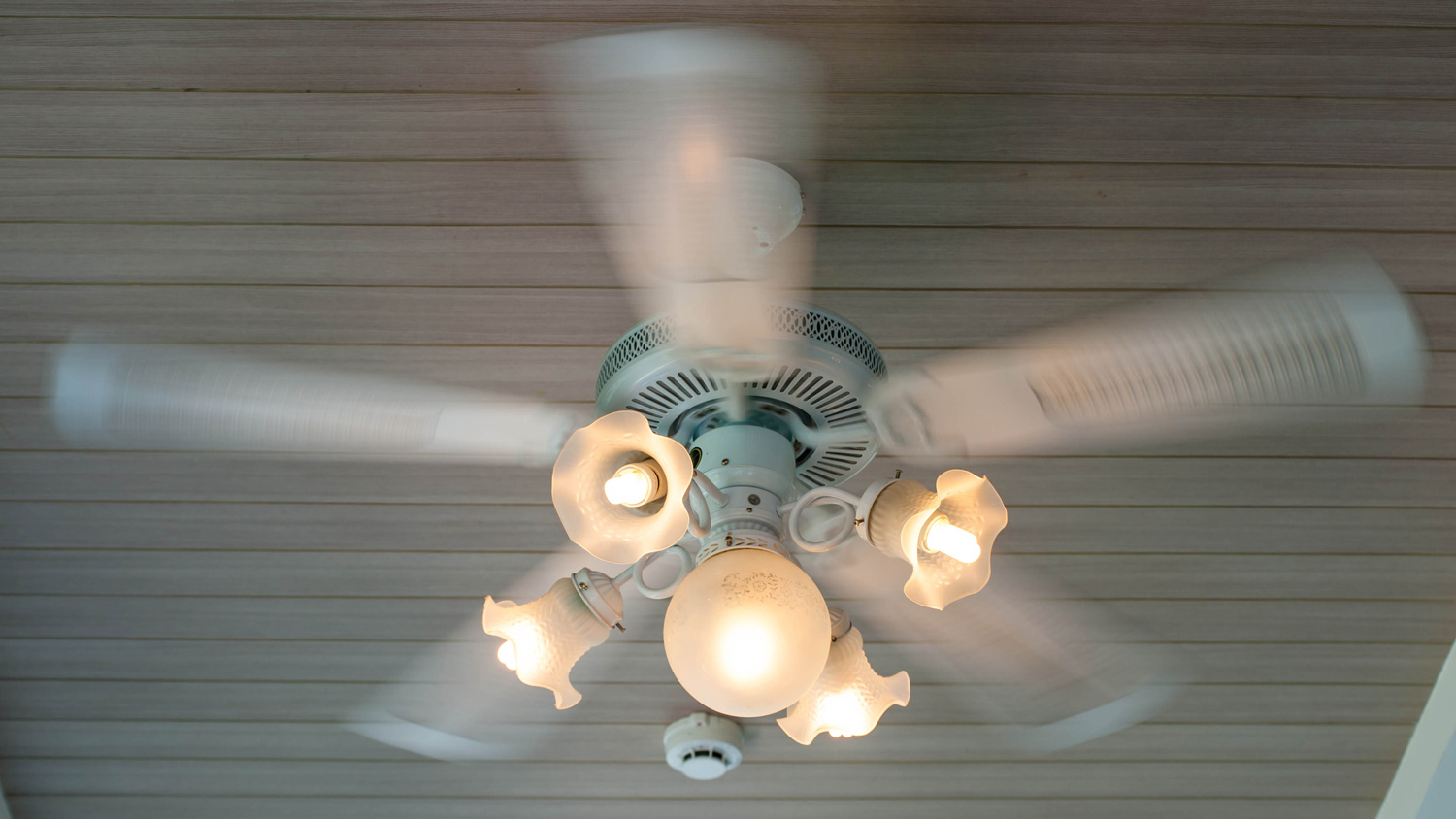Have you ever noticed that low, annoying hum coming from your ceiling fan? That constant noise can be more than just a small irritation—it can disrupt your peace and make it hard to focus or relax.
You might be wondering, “Why does my ceiling fan hum? ” and more importantly, how can you stop it? You’ll discover the common reasons behind that buzzing sound and simple steps you can take to enjoy a quiet, comfortable room again.
Keep reading, and you’ll find easy solutions that anyone can try.
Common Causes Of Ceiling Fan Hum
Ceiling fans can sometimes produce a humming noise that bothers many homeowners. This hum usually signals a problem that needs attention. Understanding the common causes helps fix the issue quickly. Below are the main reasons why your ceiling fan might hum.
Loose Fan Components
Loose parts inside the fan often cause humming sounds. Screws, blades, or the motor housing can become loose over time. These parts vibrate when the fan runs, creating a hum. Tightening all screws and checking the fan’s parts can stop the noise. Regular maintenance keeps components secure and quiet.
Electrical Issues
Electrical problems often lead to humming. The fan’s motor or wiring may have faults causing a low humming sound. Faulty capacitors or poor wiring connections can increase noise. Using a voltage tester helps identify electrical issues. Fixing wiring or replacing parts can reduce the hum significantly.
Imbalanced Blades
Blades that are uneven or bent cause the fan to hum. Imbalance makes the motor work harder and creates vibration sounds. Dust or dirt buildup on blades also affects balance. Cleaning and adjusting blades evenly helps stop the hum. Blade balancing kits are useful tools for this task.
Poor Installation
Improper installation often results in humming noises. If the fan is not mounted securely, it can vibrate and hum. Using the wrong screws or missing mounting brackets worsens the problem. Checking installation and ensuring all parts fit well stops the noise. A firm installation is key to a quiet fan.

Credit: www.reddit.com
Identifying The Source Of The Hum
Figuring out why your ceiling fan hums can save you time and money. The first step is to pinpoint exactly where the noise comes from. This helps you focus on the right fix without unnecessary replacements or calls to an electrician.
Listening For Specific Sounds
Start by turning your fan on and off while paying close attention to the hum. Is it a low, steady buzz or a high-pitched whine? Different sounds often point to different problems.
Try to identify if the hum changes with the fan speed. Does it get louder when the fan runs faster? This detail can help you decide if the issue is mechanical or electrical.
Inspecting Fan Components
After listening, look closely at the fan itself. Check if the blades are loose or unbalanced. Even a small wobble can cause the motor to work harder and hum.
Examine the motor housing for dust or debris buildup. These might interfere with the fan’s operation and create noise. Tighten any visible screws or bolts that may have loosened over time.
Testing Electrical Connections
Sometimes the hum comes from electrical issues inside the fan. Make sure the fan is switched off and then inspect the wiring connections. Loose or corroded wires can cause electrical noise.
If you notice any burnt smells or damaged wires, it’s a sign to call a professional. Testing with a multimeter can reveal voltage irregularities that might be behind the hum. Are you comfortable handling electrical parts safely? If not, don’t hesitate to seek help.
Quick Fixes For A Noisy Ceiling Fan
If your ceiling fan is humming or making noise, you don’t have to live with the distraction. Most ceiling fan hums come from simple issues that you can fix quickly without calling a professional. Tackling these common problems can save you time and restore peace to your room.
Tightening Loose Screws
Loose screws are often the main culprit behind a noisy ceiling fan. Check the screws on the fan blades and the mounting bracket. Use a screwdriver to tighten any that feel loose; even a small wobble can cause humming or rattling sounds.
Have you noticed your fan gets louder when it speeds up? That’s a clear sign screws might be loose. Regularly inspecting and tightening screws can prevent this noise from returning.
Balancing Fan Blades
Unbalanced blades create wobbling and noise. You can balance your fan blades by attaching small weights to the blade edges. Many hardware stores sell blade balancing kits that make this task easier.
Try swapping the weights between blades and running the fan each time. When the wobble and noise decrease, you’ve found the right balance. This simple trick can make your fan run smoothly and quietly.
Lubricating Moving Parts
Over time, the moving parts in your ceiling fan can dry out and cause humming or squeaking sounds. Use a few drops of light machine oil on the motor and blade bearings to reduce friction. Avoid using heavy grease as it can attract dust and worsen the problem.
Lubrication is easy to do but often overlooked. If your fan hasn’t been oiled in a while, this quick fix might be all you need to stop the hum.
Advanced Solutions For Persistent Noise
When the hum from your ceiling fan just won’t go away, simple fixes might not cut it. Persistent noise often signals deeper issues that require a closer look and more precise actions. Tackling these advanced solutions can save you from ongoing irritation and potential safety risks.
Checking For Electrical Issues
Electrical problems are a common culprit behind a humming ceiling fan. Loose wiring, faulty capacitors, or issues with the fan’s motor can cause that annoying buzz. Have you ever noticed the hum gets louder when the fan speeds up? This can indicate electrical strain.
Start by turning off the power at the breaker before inspecting connections. Tighten any loose wires and look for burnt or damaged components. Using a multimeter to test voltage can help you pinpoint where the problem lies.
Replacing Worn Components
Over time, parts like the motor bearings or capacitors wear out and cause noise. These components are often hidden but play a big role in smooth fan operation. If your fan’s hum feels more like a grinding or rattling, worn parts might be to blame.
Replacing these components isn’t always difficult but requires some technical skill. You can order replacement parts online or at hardware stores. Remember, a new capacitor or bearing can bring your fan back to silent performance.
Consulting A Professional
Sometimes, the problem goes beyond what you can safely handle. If you’ve checked wiring and swapped out parts but the hum persists, it’s time to call an expert. Professionals have the right tools and experience to diagnose complex electrical or mechanical issues.
Would you risk damaging your home’s wiring or your fan by guessing? A licensed electrician or a fan repair specialist can save you time and avoid costly mistakes. Getting professional help ensures your fan runs quietly and safely for years to come.
Preventing Future Noise Issues
Preventing noise from your ceiling fan starts with simple care and smart choices. A quiet fan runs smoothly and lasts longer. Small steps can stop annoying hums before they begin. Focus on keeping the fan clean, balanced, and well-installed. Choose fans made to high standards. These actions save time and money on repairs.
Regular Maintenance Tips
Clean dust from blades and motor often. Dust causes imbalance and noise. Tighten screws and bolts regularly. Loose parts make rattling sounds. Check blade alignment and balance yearly. Use a balancing kit if blades wobble. Lubricate the motor if it starts to squeak. Follow the fan’s manual for care instructions.
Proper Installation Practices
Secure the fan firmly to the ceiling. Loose mounting leads to vibration and hums. Use the right hardware for your ceiling type. Make sure electrical connections are tight. Avoid installing fans near noisy appliances. Keep the fan away from air vents. A stable setup reduces noise and wear.
Choosing Quality Fans
Pick fans from trusted brands with good reviews. Cheaper models often have noisy motors. Look for fans with sealed bearings. These run quieter and last longer. Select fans with balanced blades and good weight. Invest in energy-efficient models for smooth operation. Quality fans cost less over time due to fewer repairs.

Credit: www.angi.com

Credit: www.reddit.com
Frequently Asked Questions
Why Does My Ceiling Fan Make A Humming Noise?
A ceiling fan hums due to electrical issues, loose parts, or motor problems. It often indicates wiring or capacitor faults. Regular maintenance can prevent this noise and ensure smooth operation.
Can A Humming Ceiling Fan Be Dangerous?
Yes, a humming fan can be dangerous if caused by electrical faults. It may lead to overheating or fire hazards. Immediate inspection by a professional is recommended to ensure safety.
How Can I Fix A Humming Ceiling Fan?
To fix a humming fan, tighten loose screws, clean the motor, and check the capacitor. If the humming persists, consult an electrician for wiring or motor repairs.
Does A Humming Ceiling Fan Use More Electricity?
A humming ceiling fan may use more electricity if the motor struggles. Faulty components cause inefficiency, increasing energy consumption. Repairing the fan improves performance and saves power.
Conclusion
A humming ceiling fan can be annoying and distracting. It often means there is a small problem that needs fixing. Check the fan’s motor, blades, and wiring to find the cause. Regular cleaning and tightening can stop the noise quickly.
Taking action early helps your fan work better and last longer. Quiet fans make rooms more comfortable. Don’t ignore the hum—small fixes keep your fan running smooth and silent.

Home Improvement Specialist & Writer at HomeFixio
Caden Rutherford is a seasoned home improvement specialist with extensive hands-on experience in residential construction, renovations, and design. With a keen eye for detail and a passion for transforming spaces, Caden shares practical advice and expert solutions to enhance the functionality and beauty of homes. As a writer for HomeFixio, Caden combines technical knowledge with creative flair, providing readers with informative guides on everything from structural improvements to aesthetic upgrades, empowering homeowners to achieve their ideal living spaces.
